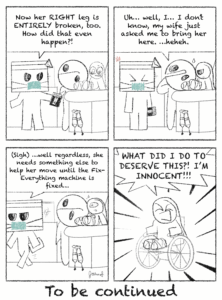On Jan. 7, Dean of the College Richard Feldman informed Theta Chi Fraternity that he modified the severest of the sanctions recommended by an administrative hearing team in December. The final version of the sanctions place Theta Chi on an inactive, “censured status” until the fall of 2010.
Conditions of inactive status stipulate that fraternity members cannot remain in their house, reside together or recruit new members this semester. One sanction requires members to complete an alcohol awareness program this semester. The fraternity will also be held responsible for needed repairs to the house; however, Acting Dean of Students Matthew Burns explained that these charges would not extend to alterations needed to accommodate future users.
“They don’t have to pay for renovations. They have to pay for reparations,” Burns said.
As early as the 2009-10 academic year, the fraternity may be allowed to live together in a residence hall, and the possibility remains open that members could eventually return to the chapter house in 2011.
Feldman described his hopes that the future of Theta Chi? takes this path.
“I have decided that I do not want to move another fraternity or residential group into the house next year, only to have to move that group out a few years later when, I hope, Theta Chi will be able to move back in,” he said. As to how the house will be used in the meantime, Feldman stated that no final decision has been made.
The release of the final sanctions culminated in a sequence of events that began last spring when the fraternity was placed on a high degree of probation, disciplinary probation, for repeated drug and alcohol violations in the past two years.
According to former president of Theta Chi Scott Weiner ’07, the fraternity was placed on social probation once during his membership of fall 2005 through March 2007, and other violations pertained to individuals only, who were jointly punished by Theta Chi and the University. While he admitted that discipline by the University was warranted, Weiner commented on the fairness of charges.
“In the University’s sanction statement, they noted a regularity of violations,” he said. “How many past violations can be taken into consideration when dealing with students who have been members of the fraternity for only a year or two? Why should the current undergraduates be punished for the past misdeeds of others?”
Disciplinary status meant that the fraternity required prior approval for all programs, whether social or charitable. The fraternity was allowed to throw a non-alcoholic event in late November; however, the University sought further discipline after the night ended with the Rochester Police and Rural Metro Ambulance Service called to aid a dangerously intoxicated student.
According to UR Security, alcohol was being served and members of the house were incompliant and resistant when Security shut down the party. One student was arrested.
Since the fraternity was already at the highest level of probation, the next procedural step would be disaffiliation from the University, Burns explained.
“We were backed into a corner,” he said. “At the highest level of probation there is nothing more we can give to you. It was not just a question of extending it. The board decided we have to do something drastic.”
A hearing held in December produced sanctions that called for immediate disaffiliation of Theta Chi from UR for five years. A second sanction would have prevented residents of the Theta Chi house from reentering University housing until next fall semester, a decision that would have affected 12 students in all. Feldman removed the latter sanction, allowing students to return to residence halls this semester.
Fraternity brothers, alumni and parents appealed the decision on grounds that the sanctions were unfair.
“We argued that in concordance with past precedent and the gravity of our code infractions over the past several years, the originally issued sanction of five years of disaffiliation was irrational and disproportionate,” President of Theta Chi and junior Jordan Wiener said.
Feldman later reduced the disputed sanction to place Theta Chi on temporary inactive status, contingent on positive evaluations in the future and close monitoring over the next five years. Any future misconduct will lead directly to disaffiliation.
Wiener responded to the adjusted punishment.
“They returned a modified sanction that was still unfairly harsh and unjustifiable,” he said.
“I had expected that they would either take the side of cooperating with us to restructure our fraternity to the best of our ability or the side of eliminating our fraternity altogether, but they seemed to take no stance whatsoever on our issue and returned a final ruling that lacked comprehension and rationale, and that seemed totally capricious and arbitrary.”
Director of Fraternity and Sorority Affairs Monica Miranda-Smalls commented on the relationship between fraternities and the University.
“In order to be a true fraternity at the University of Rochester that’s recognized and active, you have to be sure to be aligned with the missions of the college and their own fraternities and sororities and abide by any regulatory policies and expectations of the University,” Miranda-Smalls said.
Administrators refer to Theta Chi as an isolated, unfortunate event. Burns and Miranda-Smalls expressed optimism in improving Greek life through the Expectations of Excellence program, which sets a timeline to create concrete goals that work toward becoming “a larger part of the campus community rather than exist as insular groups on the periphery of the college,” as stated on the Office of Fraternity and Sorority Affairs Web Site.
Burns described his view for the future of the University’s Greek life.
“As the fraternities and sororities continue in the college to improve that relationship, I wouldn’t be surprised if there were some organizations that get left behind if they don’t improve,” he said.
Leber is a member of the class of 2011.

